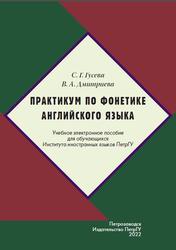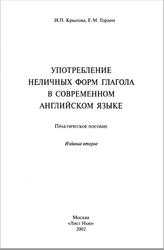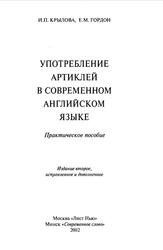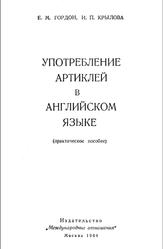Учебник включает базовый материал по фонетике, грамматике и лексике английского языка в соответствии с его современными нормами и с учетом требований лингводидактики. Комплексный характер книги, тщательно разработанный поурочный аппарат лексико-грамматических и фонетических упражнений, задания, направленные на развитие навыков и умений устной и письменной форм общения, а также аутентичные тексты для чтения обеспечивают эффективное изучение английского языка на начальном этапе.
Издание предназначено для студентов вузов, начинающих изучать английский язык в рамках программы дисциплин «Практический курс первого иностранного языка» и «Практический курс второго иностранного языка». Кроме того, он может быть рекомендован широкому кругу лиц, изучающих английский язык самостоятельно.
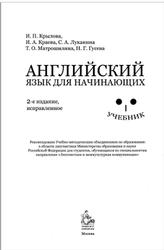
Примеры.
Practise reading the sentences:
1. Mrs ‘Nelson had 'promised her children | to ’take them to the Zoo.
2. 'Some of the 'children’s friends | had 'told them 'all a"ybout it.
3. They had been 'waiting at the ate | for about 'ten minutes.
4. 'Bill had been ‘working on the problem | for *two Л hours.
5. 'Jack 'called him up | and 'asked if he had solved it.
6. The 'students had been 'waiting for ten minutes | when the pro'fessor 'showed uр.
7. They had been 'driving on a 'country 'road for about twenty minutes | when the 'engine estopped.
Explain the use of tenses in the following sentences and make the sentences interrogative:
A. 1. Helen and Mary had packed the picnic basket by nine o’clock. 2. Mrs Nelson had often promised her children to take them to the Zoo, before she was able to find time to do it. 3. By that time Bill had given up trying to solve the problem. 4. Carl’s friends had known about the trip since last Sunday. 5. Peter had wanted to take us fishing with him since the beginning of summer.
B. 1. The children had been looking at the monkeys for nearly half an hour but didn’t want to move on. 2. Jack had been trying to solve the problem since morning and, though it was lunch time, he didn’t want to give up. 3. Professor Baker had been explaining the grammar rules for nearly an hour when Ron finally showed up. 4. Carl had been driving since eight o’clock in the morning and was dead tired. 5. Peter and Carl had been looking for a petrol station for over half an hour and began to wonder if they had gone the wrong way.
CONTENTS.
(Содержание).
От авторов.
ВВОДНО-ФОНЕТИЧЕСКИЙ КУРС.
ОСНОВНОЙ КУРС.
Unit I. IN THE CLASSROOM.
Grammar:
1. Personal pronouns. (Личные местоимении.).
2. The verb to he. (Глагол to be.).
3. Nouns in the plural. (Множественное число существительных.).
4. Articles. (Понятие об артиклях.).
5. Demonstrative pronouns this/that. (Указательные местоимения this/that.).
6. Interrogative sentences with the verb to be. Types of questions. (Вопросительные предложения с глаголом to be. Темы вопросов.).
Unit II. LETTERS AND NUMBERS. PLACES.
Grammar:
1. The construction there is/are. (Синтаксическая конструкция there is/are.).
2. The infinitive and Participle I. (Понятие об инфинитиве и причастии I.).
3. The construction there is/are + noun + Participle I.
(Конструкция there is/are + существительное + причастие I.).
4. Some cases of irregular plurals of nouns. (Особые случаи образования множественного числа существительных.).
5. The use of many, much, a lot of. (Употребление many, much, a lot of.).
Unit III. COLLEGE AND HOME.
Grammar:
1. Present Continuous.
2. The verb to have in affirmative sentences. (Глагол to have в утвердительных предложениях.).
3. Possessive pronouns. (Притяжательные местоимения.).
4. The indefinite pronoun some. (Неопределенное местоимение some.).
5. The indefinite pronoun other. (Неопределенное местоимение other.).
6. Some cases of the use of articles with countable and uncountable nouns.
(Некоторые случаи употребления артиклей с исчисляемыми и неисчисляемыми существительными.).
7. The imperative mood. (Повелительное наклонение.).
8. Special questions with who and what. (Специальные вопросы c who и what.).
Unit IV. FAMILY AND CLASS.
Grammar:
1. The indefinite pronouns some, any, no. (Неопределенные местоимения some, any, no.).
2. The possessive case. (Притяжательный падеж.).
3. The pronoun it. (Местоимение it.).
4. Numerals from 11. (Числительные от 11.).
Unit V. AT WORK AND AT HOME.
Grammar:
1. Participle II. Regular and irregular verbs. (Причастие II. Правильные и неправильные глаголы.).
2. Present Perfect.
3. The objective case of personal pronouns. (Объектный падеж личных местоимений.).
Unit VI. WHAT’S THE TIME? WEATHER AND SEASONS.
Grammar:
1. Present Indefinite.
2. Adverbs of frequency, their place in the sentence. (Наречия частотности, их место в предложении.).
3. The modal verbs can and must. (Модальные глаголы can и must.).
4. The indefinite pronouns few, little, a few, a little. (Неопределенные местоимения few, little, a few, a little.).
5. The indefinite pronouns all, every, each. (Неопределенные местоимения all, every, each.).
6. The use of articles with certain groups of nouns. (Употребление артиклей с некоторыми группами существительных.).
7. Ordinal numerals. (Порядковые числительные.).
Unit VII. EVERYDAY ROUTINE. DO’S AND DON’TS.
Grammar:
1. More of Present Indefinite.
2. Reflexive pronouns. (Возвратные местоимения.).
3. The verb to have, review. (Глагол to have: обзор.).
Unit VIII. DRIVING. MAKING BIG DECISIONS.
Grammar:
1. Present Perfect Continuous.
2. More of Present Perfect.
3. More of the imperative mood.
4. Tag questions (Disjunctive questions). (Разделительные вопросы.).
5. The absolute form of possessive pronouns. (Абсолютная форма притяжательных местоимений.).
6. Phrasal verbs. (Фразовые глаголы.).
Unit IX. SHOPPING. A LETTER.
Grammar:
1. Degrees of comparison of adjectives. (Степени сравнения прилагательных.).
2. Degrees of comparison of adverbs. (Степени сравнения наречий.).
3. Comparative structures. (Структура сравнительных предложений.).
4. The use of the infinitive. (Употребление инфинитива.).
Unit X. COOKING AND GARDENING.
Grammar:
1. The modal verb have to. (Глагол to have в модальном значении.).
2. The indefinite pronouns: something, anything, nothing, everything.
3. The place of direct and indirect objects in the sentence. (Место прямого и косвенного дополнений в предложении.).
Unit XI. HOW ARE YOU FEELING TODAY? SUMMER ON A FARM. NEWS IN BRIEF.
Grammar:
1. Past Indefinite.
2. The indefinite pronouns somebody, someone, anybody, anyone, nobody, no-one (no one)., everybody, everyone.
3. More of comparative adjectives and adverbs.
4. Articles with some proper names. (Употребление артиклей с именами собственными.).
5. Common expressions without articles. (Устойчивые сочетания без артиклей.).
Unit XII. A GOOD SECRETARY. GOING TO A MELTING. JOINING A LIBRARY.
Grammar:
1. Future forms. (Формы выражения будущего.).
2. Articles with countable nouns in some syntactic functions (predicative and apposition). (Употребление артиклей с исчисляемыми существительными в функции предикатива (именной части составного именного сказуемого). и приложения.).
3. The modal verb may.
4. Exclamatory sentences. (Восклицательные предложения.).
5. “Think”-questions. (Косвенный вопрос, вводимый фразой Как вы думаете?).
Unit XIII. LEISURE TIME. GOING PLACES.
Grammar:
1. More of Present Continuous.
2. Past Continuous.
3. The compound nominal predicate. (Составное именное сказуемое.).
Unit XIV. GOING TO THE ZOO. A DAY THAT PROMISED TO BE PLEASANT.
Grammar:
1. Past Perfect.
2. Past Perfect Continuous.
3. The generic function of the definite article. (Употребление определенного артикля с обобщающим значением.).
Unit XV. WRONG NUMBER. A MOTOR TOUR.
Grammar:
1. The sequence of tenses. (Согласование времен.).
2. Future in the past. (Будущее в прошедшем.).
3. Indirect speech. (Косвенная речь.).
Unit XVI. SHOWING VISITORS ROUND A FACTORY. A VISIT TO A SCHOOL.
Grammar:
1. The Passive Voice. (Пассивный залог.).
2. The complex object construction. (Синтаксическая конструкция «Сложное дополнение».).
3. Word building. (Словообразование.).
Бесплатно скачать электронную книгу в удобном формате, смотреть и читать:
Скачать книгу Английский язык для начинающих, Крылова И.П., Краева И.А., Луканина С.А., Матрошилина Т.О., Гусева Н.Г., 2010 - fileskachat.com, быстрое и бесплатное скачивание.
Скачать pdf
Ниже можно купить эту книгу, если она есть в продаже, и похожие книги по лучшей цене со скидкой с доставкой по всей России.Купить книги
Скачать - pdf - Яндекс.Диск.
Дата публикации:
Теги: учебник по английскому языку :: английский язык :: Крылова :: Краева :: Луканина :: Матрошилина :: Гусева
Смотрите также учебники, книги и учебные материалы:
Следующие учебники и книги:
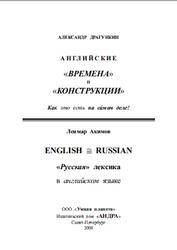 Английские времена и конструкции, Драгункин А.Н., 2008 — Книга известного петербургского филолога Александра Драгункина открывает серию Почини свой английский! . В ней совершенно по-новому рассматривается и подаётся самый … Книги по английскому языку
Английские времена и конструкции, Драгункин А.Н., 2008 — Книга известного петербургского филолога Александра Драгункина открывает серию Почини свой английский! . В ней совершенно по-новому рассматривается и подаётся самый … Книги по английскому языку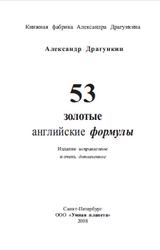 53 золотые формулы английского языка, Драгункин А.Н., 2008 — Предлагаемая книга содержит уникальные разработки известного петербургского филолога Александра Драгункина - автора Нового русского метода изучения английского языка. Формулы представляют … Книги по английскому языку
53 золотые формулы английского языка, Драгункин А.Н., 2008 — Предлагаемая книга содержит уникальные разработки известного петербургского филолога Александра Драгункина - автора Нового русского метода изучения английского языка. Формулы представляют … Книги по английскому языку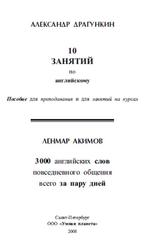 10 занятий по английскому, Драгункин А.Н., 2008 — Данная книга представляет собой усовершенствованный вариант авторского Малого прыжка в английский , переработанный для преподавания и изучения английского языка на … Книги по английскому языку
10 занятий по английскому, Драгункин А.Н., 2008 — Данная книга представляет собой усовершенствованный вариант авторского Малого прыжка в английский , переработанный для преподавания и изучения английского языка на … Книги по английскому языку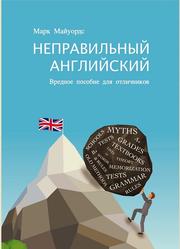 Неправильный английский, Вредное пособие для отличников, Майуордс М., 2017 — Язык - это живой организм, а не набор алгоритмов и грамматических структур. Необходимо понимать разницу между изучением языка и его … Книги по английскому языку
Неправильный английский, Вредное пособие для отличников, Майуордс М., 2017 — Язык - это живой организм, а не набор алгоритмов и грамматических структур. Необходимо понимать разницу между изучением языка и его … Книги по английскому языку
Предыдущие статьи:
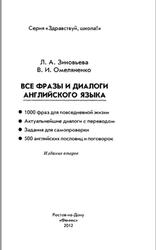 Все фразы и диалоги английского языка, Зиновьева Л.А., Омеляненко В.И., 2012 — Основная цель пособия сформировать навыки диалогической речи в различных жизненных ситуациях, смоделированных на основе диалогов. Сборник фраз и диалогов предназначен … Книги по английскому языку
Все фразы и диалоги английского языка, Зиновьева Л.А., Омеляненко В.И., 2012 — Основная цель пособия сформировать навыки диалогической речи в различных жизненных ситуациях, смоделированных на основе диалогов. Сборник фраз и диалогов предназначен … Книги по английскому языку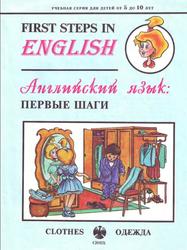 First steps in English, английский язык: первые шаги, Clothes, Одежда, Минаев Ю.Л., 1995 — Свыше 1000 слов из словарного запаса ребенка 5-10 лет. 3анимательная форма изложения учебного материала. Более 500 цветных рисунков. Стихи, пословицы, … Книги по английскому языку
First steps in English, английский язык: первые шаги, Clothes, Одежда, Минаев Ю.Л., 1995 — Свыше 1000 слов из словарного запаса ребенка 5-10 лет. 3анимательная форма изложения учебного материала. Более 500 цветных рисунков. Стихи, пословицы, … Книги по английскому языку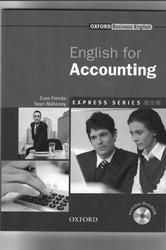 English for accounting, Frendo E., Mahoney S., 2007 — English for Accounting is part of the EXPRESS SERIES. It is the ideal quick course for anyone who needs to … Книги по английскому языку
English for accounting, Frendo E., Mahoney S., 2007 — English for Accounting is part of the EXPRESS SERIES. It is the ideal quick course for anyone who needs to … Книги по английскому языку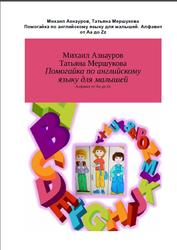 Помогайка по английскому языку для малышей, Алфавит от Aa до Zz, Азнауров М., Мершукова Т., 2018 — Уважаемые родители! Английский язык для вашего малыша что-то таинственное, незнакомое. Он ещё не разобрался в деталях родного языка, а тут … Книги по английскому языку
Помогайка по английскому языку для малышей, Алфавит от Aa до Zz, Азнауров М., Мершукова Т., 2018 — Уважаемые родители! Английский язык для вашего малыша что-то таинственное, незнакомое. Он ещё не разобрался в деталях родного языка, а тут … Книги по английскому языку

